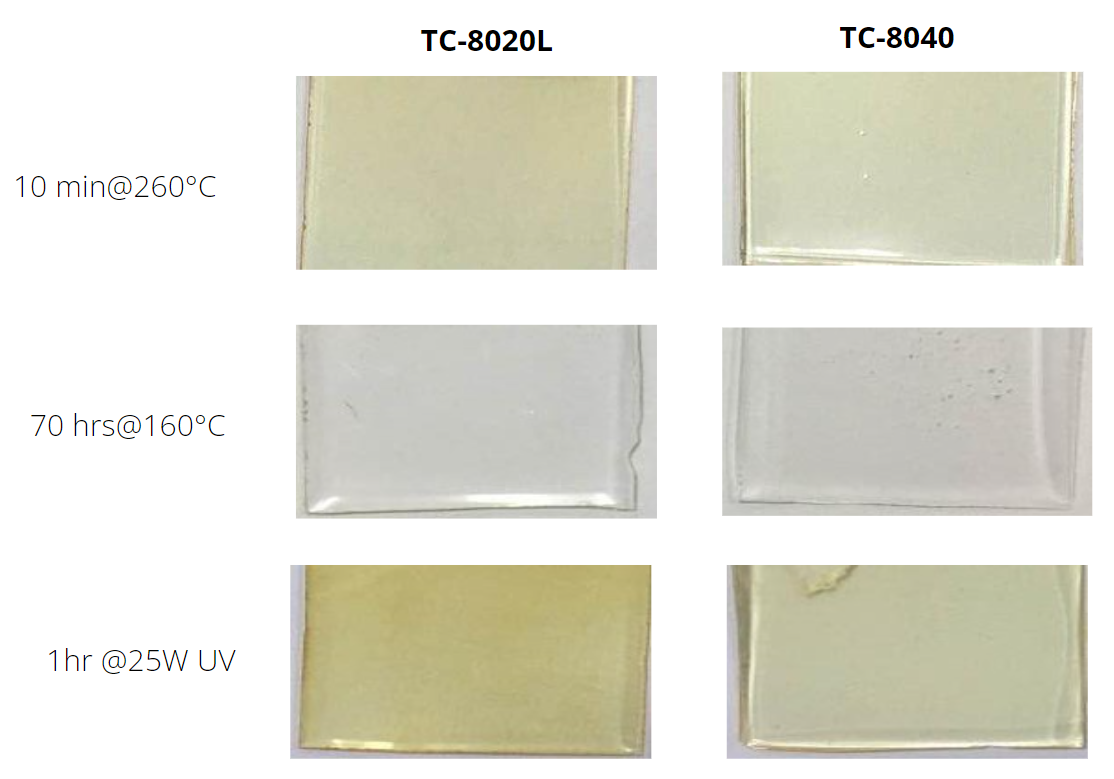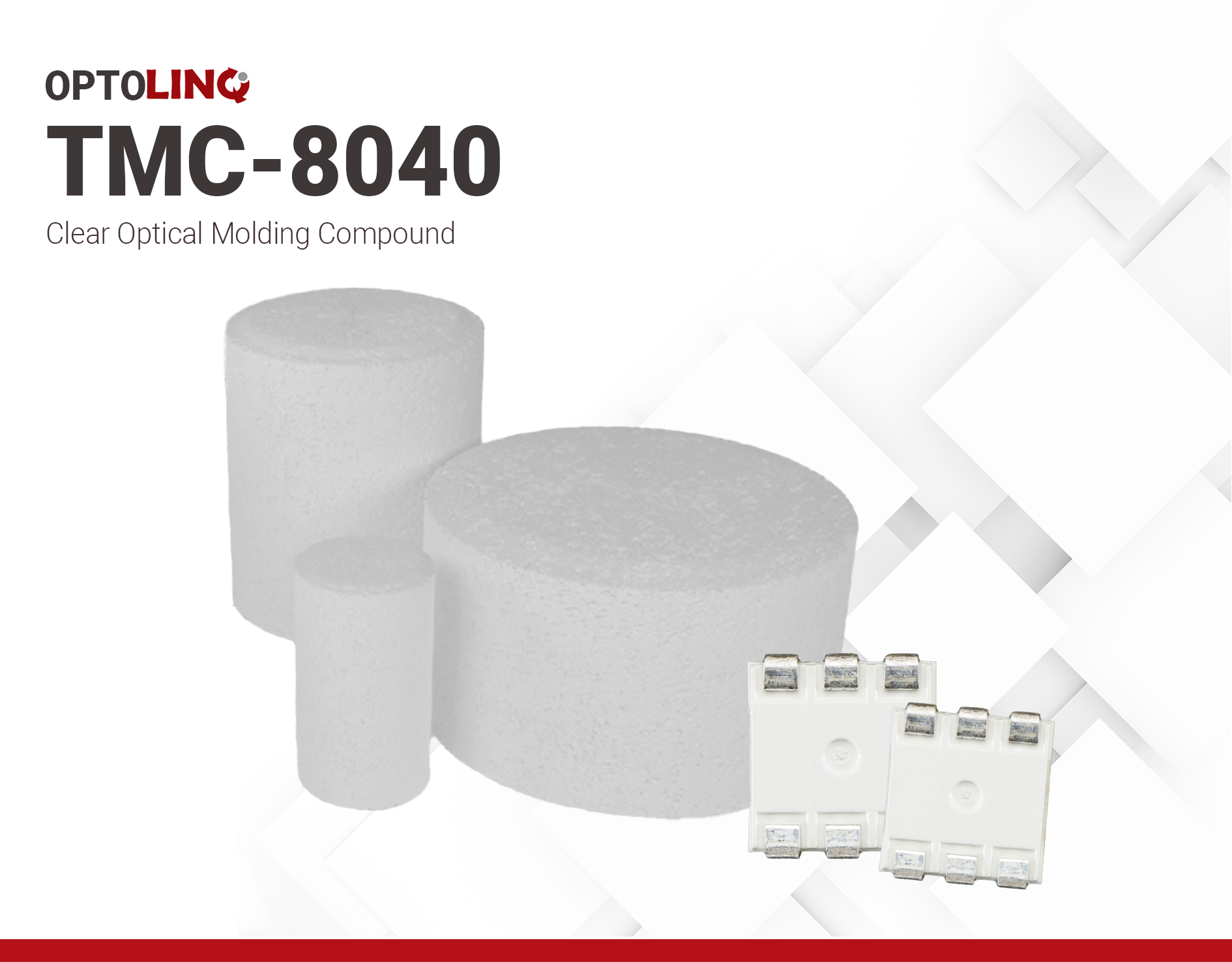TMC-8040 | Optically clear Molding Compound
- High reliability
- 7 segment monochrome LED
- Medium blue ray decay
Product Description
OPTOLINQ TMC-8040 is a high-performance optically clear epoxy developed for high reliability white chip monochrome LED applications. This anhydride cured, monocomponent BisA and Cycloaliphatic combination achieves superior adhesion performance and great transmittance. Its stability at high temperature aids towards a good package performance and long life. It works very similar, if better than XX-600H product types.
TMC-8040 is able to offer medium blue-ray decay . This anti blue light epoxy features good moisture resistance and passes TCT, PCT and IR reflow testing with good discolouration results. It is a reliable product that is targetin at the stringent MSL 3/2A JEDEC requirements.
OPTOLINQ TMC-8040 is developed based on TMC-8020T with improved moisture resistance and anti-blue decay properties. Check the Reliability Test Comparison between TMC-8040 and TMC-8020T.
Typical Applications
- Low-Power LED & Emitters
- Pulse Oximeter Sensors
- Ambient Light Sensors
- IR and Near-IR Sensors
- Data transmission and industrial fibers.
Comparable With: XX-600
Technical Specifications
| General Properties | |||||||||
| Specific Gravity Specific Gravity Specific gravity (SG) is the ratio of the density of a substance to the density of a reference substance; equivalently, it is the ratio of the mass of a substance to the mass of a reference substance for the same given volume. For liquids, the reference substance is almost always water (1), while for gases, it is air (1.18) at room temperature. Specific gravity is unitless. | 1.22 | ||||||||
| Physical Properties | |||||||||
| Spiral Flow @ 175°C | 150 - 250 cm | ||||||||
| Chemical Properties | |||||||||
| Water Absorption | 0.17 % | ||||||||
| Mechanical Properties | |||||||||
| |||||||||
| |||||||||
| |||||||||
| Thermal Properties | |||||||||
| |||||||||
| |||||||||
| Glass Transition Temperature (Tg) Glass Transition Temperature (Tg) The glass transition temperature for organic adhesives is a temperature region where the polymers change from glassy and brittle to soft and rubbery. Increasing the temperature further continues the softening process as the viscosity drops too. Temperatures between the glass transition temperature and below the decomposition point of the adhesive are the best region for bonding. The glass-transition temperature Tg of a material characterizes the range of temperatures over which this glass transition occurs. | 135 °C | ||||||||
| Curing Conditions | |||||||||
| |||||||||
| |||||||||
| Transfer Pressure | 10 - 40 kg/cm2 | ||||||||
| Transfer Time | 20 - 50 s | ||||||||
Additional Information
Both TMC-8020 and TMC-8040 pass the reflow tests and double 85 tests, showing no dead lights and no color shift in substrates. TMC-8040 has improved moisture-resistance property, compared with TMC-8020 series and better performance in pressure cooking test (PCT) and blue decay test. TMC-8040 is suitable for surface mount packages, requiring MSL3 & 2A.
| TEST | PRODUCT | TEST CONDITION | RESULT |
| IR Reflow | TMC-8020L | 3 x 30 sec @260°C, IR Reflow | Pass |
| TMC-8040 | 3 x 30 sec @260°C, IR Reflow | Pass | |
| Double 85 Test | TMC-8020L | 5V * 20mA, 75hrs @85°C * 85%RH | Pass |
| TMC-8040 | 5V * 20mA, 75hrs @85°C * 85%RH | Pass | |
Thermal Cycling | TMC-8020L | -40°C~100°C, 200 cycles | Pass |
| TMC-8040 | -40°C~100°C, 200 cycles | Pass | |
Pressure Cook | TMC-8020L | 2 x 8hrs @121°C, 100%RH, 2 atm | Fail |
| TMC-8040 | 2 x 8hrs @121°C, 100%RH, 2 atm | Pass |

Yellowing Results Comparison Between TMC-8020L and TMC-8040



